Key takeaways:
- Positive discipline focuses on teaching and understanding children’s feelings rather than punishing them, fostering self-discipline and problem-solving skills.
- Child health support is vital for overall well-being, with strong support systems enhancing emotional health and resilience.
- Implementing family rules together and using ‘time-ins’ promotes ownership and open communication, leading to stronger family bonds.
- Celebrating small successes builds children’s confidence and encourages them to take on new challenges, fostering resilience and self-worth.
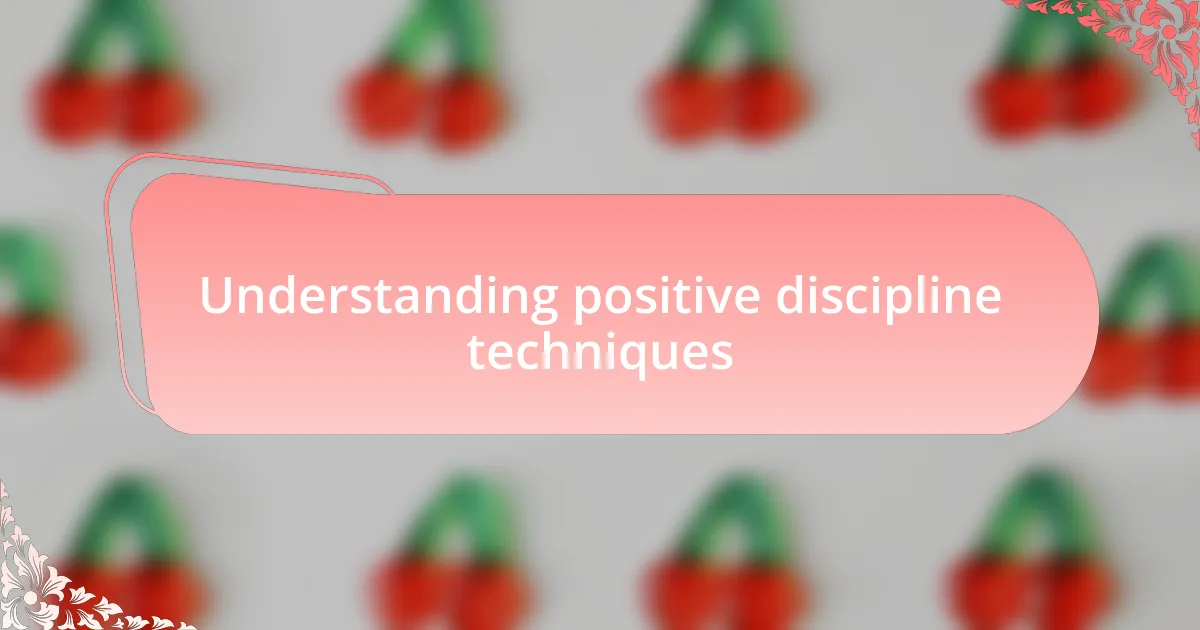
Understanding positive discipline techniques
Positive discipline techniques focus on teaching children rather than punishing them. I vividly remember one evening, my son threw a tantrum when he didn’t want to clean up his toys. Instead of raising my voice, I knelt beside him, asking how he felt about the mess. This simple question opened up a dialogue, revealing that he felt overwhelmed, and it turned that tough moment into a learning experience.
In my journey with positive discipline, I’ve discovered that the goal is to foster self-discipline and problem-solving skills rather than compliance through fear. Reflecting on my own childhood, I realize how much better I would have responded to understanding rather than punishment. How often do we overlook the power of empathy in parenting? Each child is unique, and understanding their feelings can create an environment where they feel heard and valued.
Implementing these techniques requires a shift in mindset. I’ve learned that instead of reacting impulsively when frustration arises, it helps to pause and consider what message I want to convey. I often ask myself, “What can I teach my child in this moment?” This approach doesn’t just benefit my child; it also strengthens our bond, making our connection deeper and more resilient.
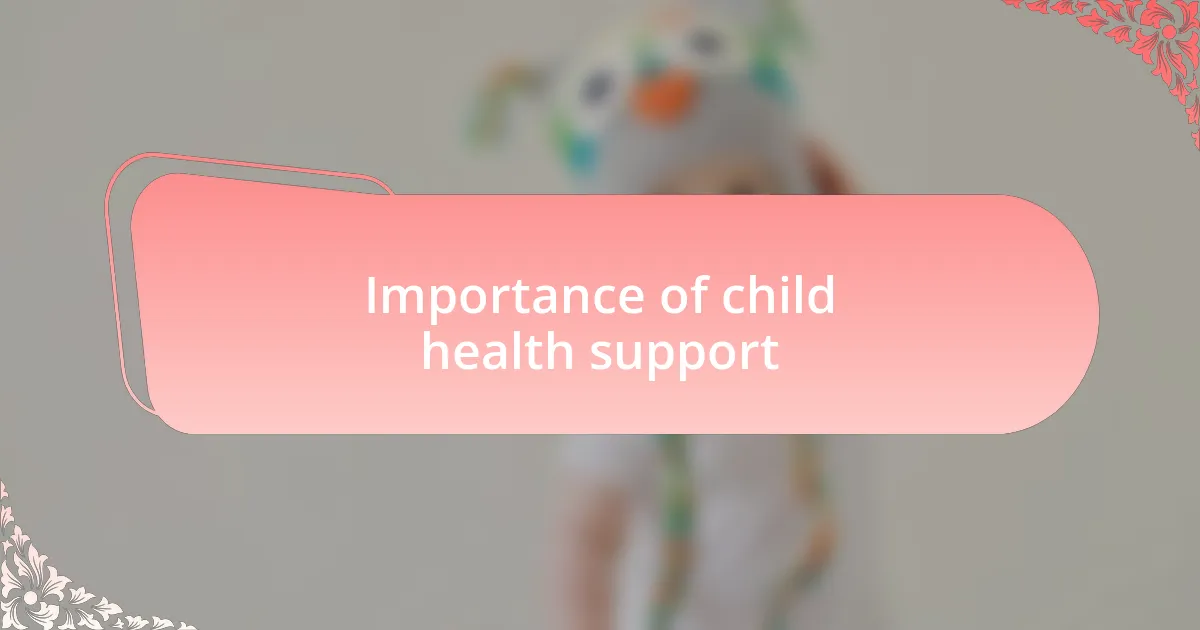
Importance of child health support
Child health support is crucial in laying the foundation for a child’s overall well-being. I remember the concern I felt when my daughter wasn’t eating well; it was alarming to see her energy dip. It made me realize how interconnected nutrition and emotional health are—fueling their bodies is just as important as nurturing their minds.
The impact of strong support systems is profound. During a challenging phase for my son, when he struggled with anxiety about school, I saw firsthand how open communication and professional guidance transformed his outlook. Each conversation was a step towards building his confidence and resilience, which in turn illustrated the invaluable role of holistic health support in childhood development.
Furthermore, I find that awareness of health support creates a ripple effect in communities. When we prioritize the well-being of our children, we inspire others and foster healthier environments for them to grow. Isn’t it uplifting to think how collective efforts can pave the way for future generations? It reinforces my belief that every action counts in promoting a culture of health and understanding for our kids.
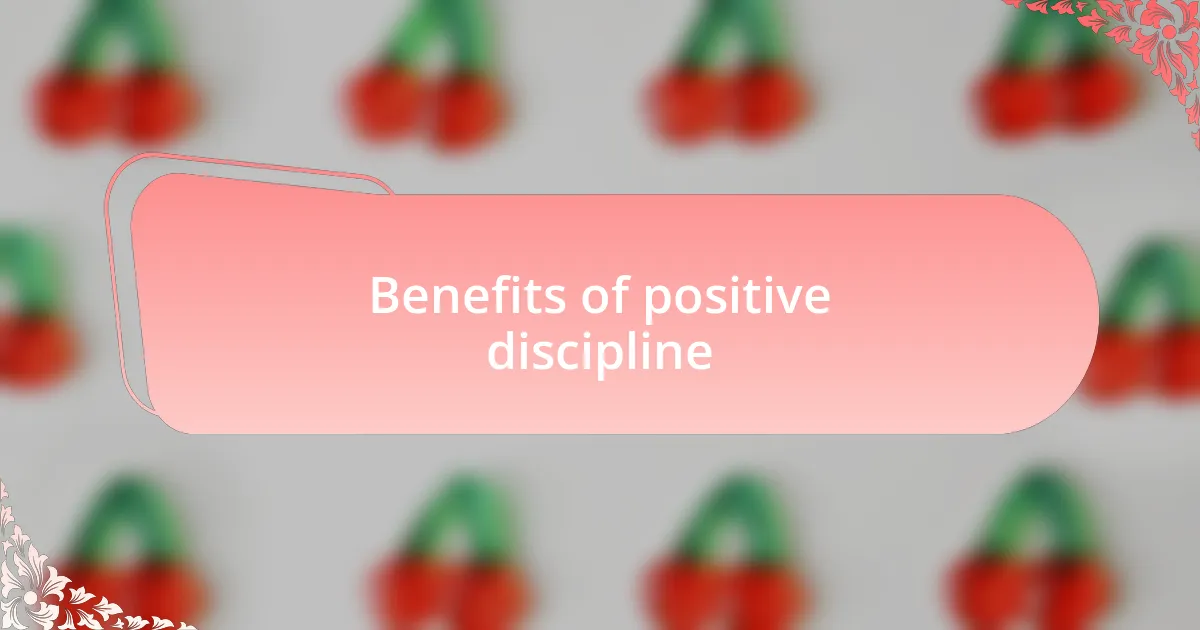
Benefits of positive discipline
Practicing positive discipline has significantly strengthened my relationship with my children. I recall a time when my son broke a rule, and instead of reacting with anger, I chose to have a calm discussion about his choices. This approach not only allowed him to express his feelings but also helped him understand the consequences of his actions in a supportive way.
One of the most notable benefits of positive discipline is the development of intrinsic motivation in children. I noticed that my daughter began to take more responsibility for her actions, deciding on her own to help clean up her room after learning about the importance of her personal space. It was heartwarming to see her transition from complying out of fear to embracing the idea of responsibility.
Furthermore, fostering a respectful and empathetic environment through positive discipline promotes emotional intelligence. I often reflect on how my kids have started recognizing each other’s feelings; they now communicate their frustrations and disagreements more respectfully. Isn’t it reassuring to witness children grow into capable individuals who can navigate their emotions and those of others? This kind of emotional skill will serve them well throughout their lives.
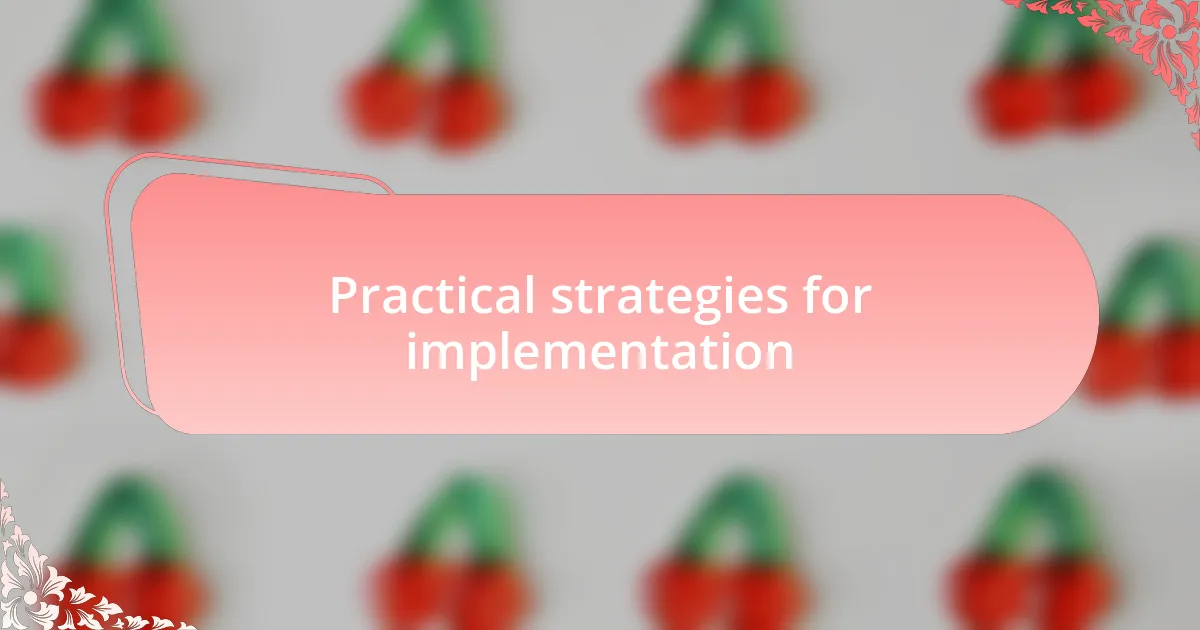
Practical strategies for implementation
One practical strategy I found effective is to create a clear set of family rules together with my children. In one instance, we sat down with a large sheet of paper and colored markers, and I let them express what they thought were important rules to follow. This activity not only empowered them but also ensured they felt a sense of ownership over the rules, making it easier for them to abide by them.
In moments where disagreements arise, I implement ‘time-ins’ instead of traditional time-outs. I remember a particularly heated argument where my daughter felt overwhelmed. By inviting her to sit with me and talk through her feelings instead of isolating her, I noticed she was more receptive to learning about compromise. Have you ever tried this approach? It transformed a tense situation into a learning opportunity for both of us.
I also incorporate regular family meetings as a platform for open communication. These meetings have become a space for my kids to voice their concerns and share their successes. I recall one meeting where my son shared how he felt uncomfortable about a change at school, and together, we brainstormed ways to help him cope. Isn’t it amazing how creating a safe space for dialogue can lead to stronger family bonds?
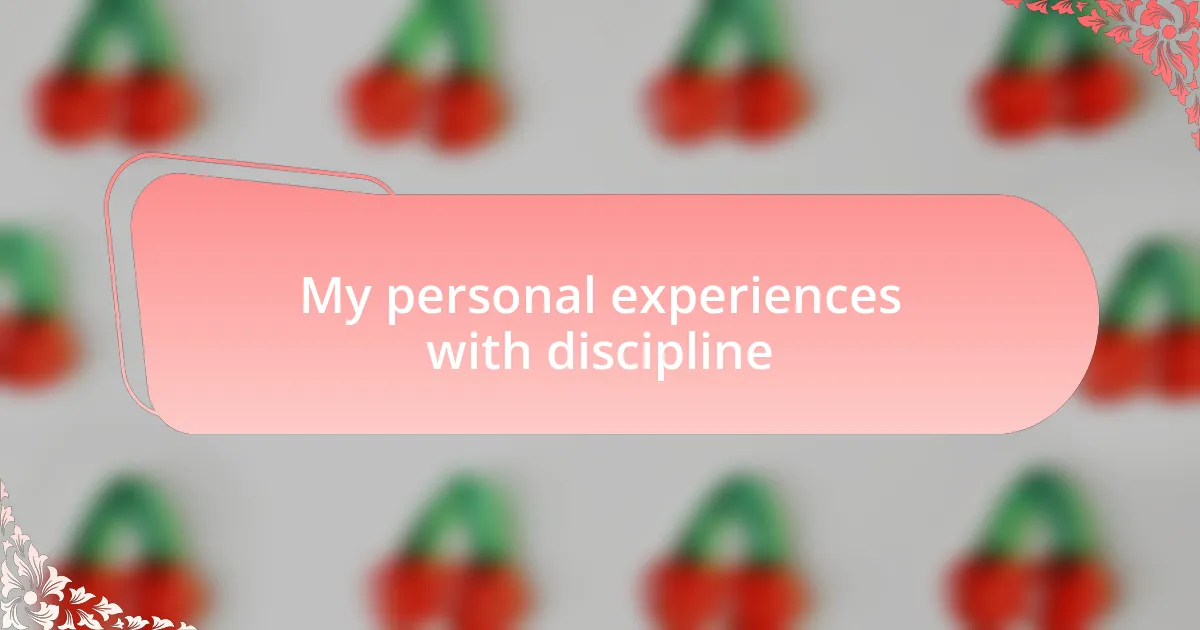
My personal experiences with discipline
Discipline has always been a journey for me, shaped by trial and error. I vividly remember a particularly challenging day when my son had a meltdown over a missed playdate. Instead of reacting in frustration, I chose to explain to him why there are sometimes changes in plans. This approach not only diffused the immediate situation but also taught him about managing disappointment – a skill we’re all still working on.
One memorable instance was when I discovered the power of choices. During a grocery trip, my daughter was reluctant to leave without a toy. Instead of simply saying no, I offered her two options – she could choose a small book or a snack. Watching her light up at having a say in the decision taught me that discipline could be about guiding rather than controlling. Have you ever noticed how giving choices can reduce resistance?
Through my experiences, I’ve learned that reflecting on discipline moments is essential. After a tough day filled with tantrums, I found myself journaling my thoughts. This process revealed that those challenging times often masked opportunities for growth. By tuning into these feelings, I’ve become more patient and intentional in my approach, fostering a more nurturing environment for my children. Isn’t it fascinating how reflection can shift your perspective?
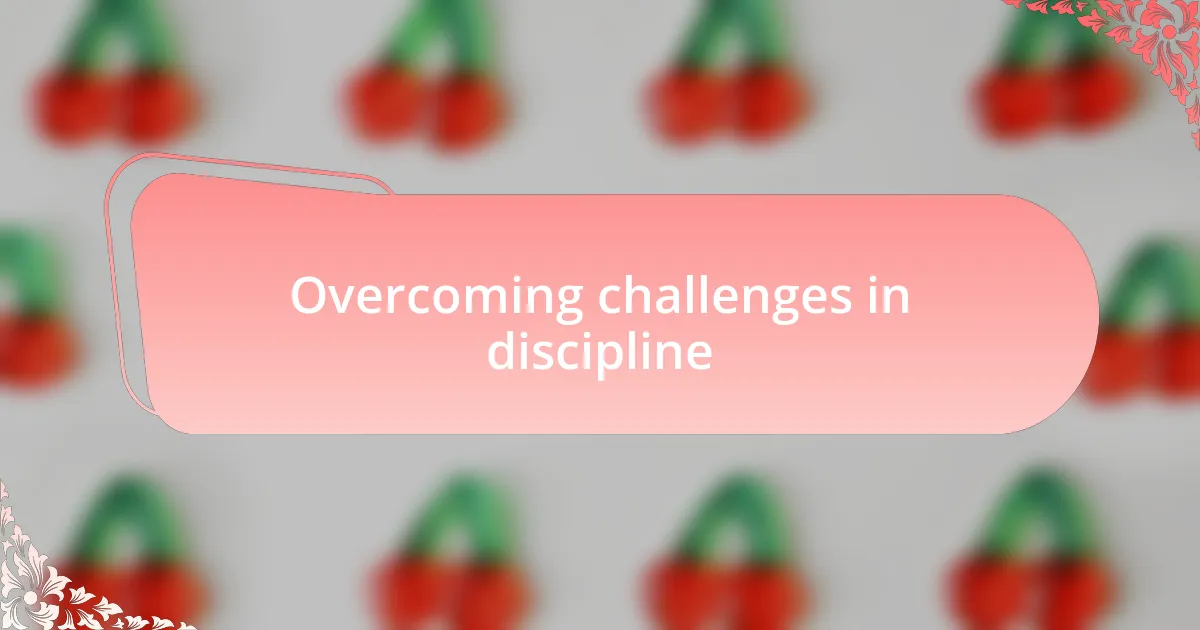
Overcoming challenges in discipline
It’s no surprise that challenges in discipline often leave us feeling overwhelmed. I remember a time when my son pushed boundaries during family gatherings, and instead of getting flustered, I decided to establish a clear set of expectations beforehand. By communicating openly with him about our family rules, I found that he was much more willing to cooperate, which made those events so much more enjoyable.
There are moments when I’ve faced my own impatience, especially when my daughter dawdles during our morning routine. It happened one hectic morning when I took a step back, realizing my frustration was creating a negative atmosphere. I chose to engage her in conversation, asking her how we could make the mornings smoother together. This simple shift in approach not only transformed our mornings, but it also fostered her sense of teamwork.
Sometimes, I grapple with the fear of not being consistent enough in my discipline strategies. I recall feeling defeated when I realized that my children were testing the limits I had set. I took a deep breath and decided to revisit our agreed-upon rules, reinforcing them gently but firmly. This experience taught me that consistency doesn’t mean rigidity—it means being present and adaptable while still holding my kids accountable. Have you ever felt that tension between being firm and being flexible?
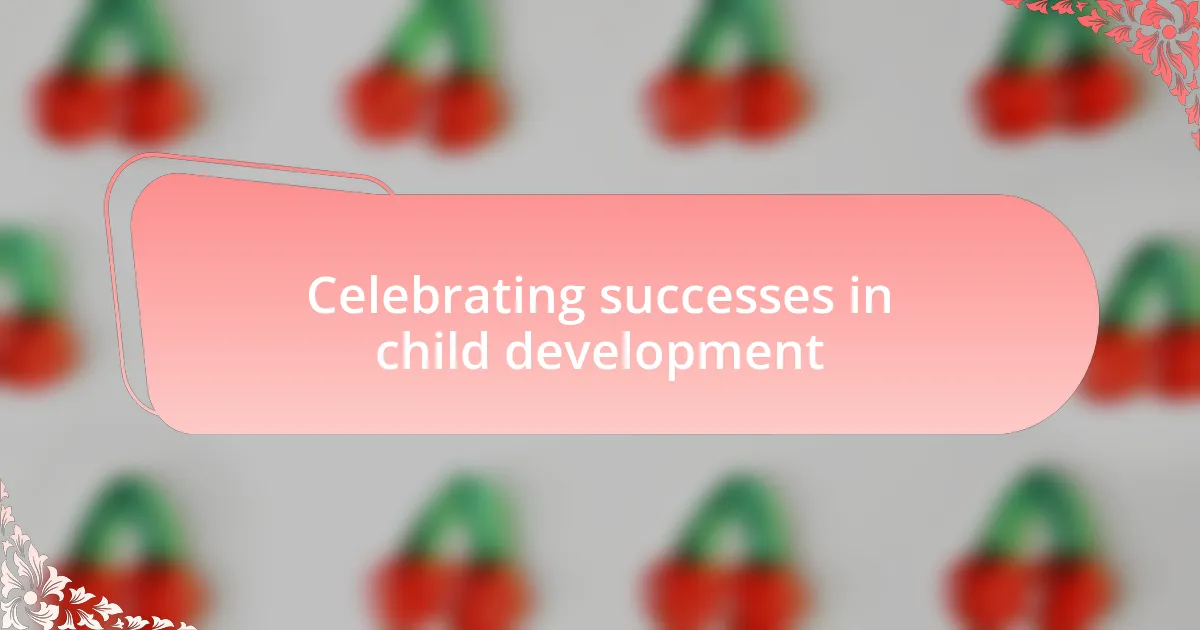
Celebrating successes in child development
The moments when I notice my child achieve a milestone are truly priceless. Just last week, my daughter proudly tied her shoes for the first time. The joy radiating from her face made me think about how celebrating these small victories can foster their confidence and motivate them to tackle more challenging tasks. Have you ever seen how a simple high five or a pat on the back can light up a child’s world?
Each time my son learns a new skill, I cherish the opportunity to recognize his effort. When he successfully completed a puzzle by himself, I celebrated not just the achievement but the perseverance he showed throughout the process. This taught me that acknowledging hard work is just as important as the end result. It creates an environment where children feel encouraged to push themselves further. What if we all took a moment to applaud even the tiny wins?
Reflecting on my own upbringing, I remember how celebrating successes, whether big or small, encouraged me to strive for more. It filled me with a sense of pride that I still carry today. As I strive to cultivate that same supportive atmosphere in my home, I’m reminded that each celebration, no matter how minor, plants a seed of resilience and self-worth in our children. In what ways do you celebrate your child’s unique progress?